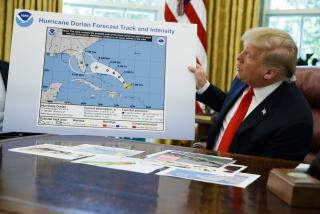White House whoppers: Six times a president misled the public
There is a long history of presidents misleading the public, sometimes unwittingly and other times on purpose. Here are six occasions in recent history when occupants of the Oval Office proved less than truthful.
Lyndon B. Johnson and the Gulf of Tonkin incident
Late on the night of Aug. 4, 1964, President Johnson delivered a nationally televised address announcing what he described as an attack by North Vietnam on the Navy warships Maddox and Turner Joy.
The episode was used as justification to escalate the U.S. military involvement in Vietnam; Congress essentially gave Johnson a free hand to wage war as he saw fit. While details surrounding the purported attack remain disputed to this day, it was widely believed that Johnson was less than forthcoming about the circumstances that plunged the U.S. into the deeply unpopular conflict.
Richard M. Nixon and Watergate
The events that forced the only presidential resignation in U.S. history were encased in a catacomb of lies, starting with Nixon’s categorical denial of any connection to the June 1972 break-in at Democratic National Committee headquarters in Washington’s Watergate office complex.
While it remains unclear whether Nixon knew of the burglary in advance, tape recordings of private conversations showed the length to which he and top aides went in trying to cover up the crime. The president appealed to the Supreme Court, seeking to block release of the tapes.
Nixon announced his resignation on Aug. 8, 1974, rather than face near-certain impeachment and removal from office.
Ronald Reagan and the Iran-Contra affair
Despite repeated public denials, the Reagan administration sold arms to the hostile Iranian government and used the proceeds to fund anti-communist rebels in Nicaragua — ignoring a congressional ban.
“We did not — repeat, did not — trade weapons or anything else for hostages,” Reagan said. “Nor will we.”
Months later, after an independent inquiry detailed the transaction, the president said he was mistaken. “My heart and my best intentions still tell me that’s true, but the facts and the evidence tell me it is not,” he said in a speech from the Oval Office. “What began as a strategic opening to Iran deteriorated, in its implementation, into trading arms for hostages.”
Bill Clinton and Monica Lewinsky
In 1995 and 1996, Clinton conducted an extramarital affair with Monica Lewinsky, a 22-year-old White House intern.
When details of the affair surfaced in January 1998, Clinton flatly insisted he “did not have sexual relations with that woman, Miss Lewinsky,” a lie that he repeated to his wife, Hillary; his staff; his Cabinet, and in repeated media interviews.
The matter spilled into a pending investigation of a failed real estate investment during Clinton’s days as Arkansas governor, leading to an unprecedented grand jury appearance by a sitting president. After testifying, Clinton delivered a national address in which he admitted lying about his relationship with Lewinsky and expressed his regrets.
George W. Bush and the weapons of mass destruction
The Bush administration offered several reasons for the 2003 invasion of Iraq and the toppling of dictator Saddam Hussein. Chief among them was the threat of an attack on the U.S. or its allies using weapons of mass destruction.
“We found the weapons of mass destruction,” Bush said two months into the invasion, in an interview on Polish television. “For those who say we haven’t found the banned manufacturing devices or banned weapons, they’re wrong; we found them.”
In fact, hundreds of experts from the U.S., Australia and Britain, tasked with locating WMD stockpiles, failed to document any existing biological or nuclear weapons in Iraq — a fact Bush later conceded.
Barack Obama and the Affordable Care Act
As part of his effort promoting a sweeping healthcare overhaul, Obama sought to assuage concerns by promising Americans “if you like your healthcare plan, you can keep it.”
According to the watchdogs at PolitiFact.com, the president repeated the assertion more than three dozen times, even though it proved false for millions of Americans.
At first, Obama tried to revise his claim by asserting, “What we said was you can keep it if it hasn’t changed since the law passed.”
After an outcry, however, Obama conceded that he had misled the public and apologized. “We weren’t as clear as we needed to be in terms of the changes taking place,” the president said in an NBC interview.
There’s a long history of presidential untruths. Here’s why Donald Trump is ‘in a class by himself’
People from all around California are heading to the Central Valley to defend Obamacare. Here’s why
For victims of San Bernardino terrorist attack, conflicting views about Trump policy in their name
More to Read
Get the L.A. Times Politics newsletter
Deeply reported insights into legislation, politics and policy from Sacramento, Washington and beyond. In your inbox three times per week.
You may occasionally receive promotional content from the Los Angeles Times.











